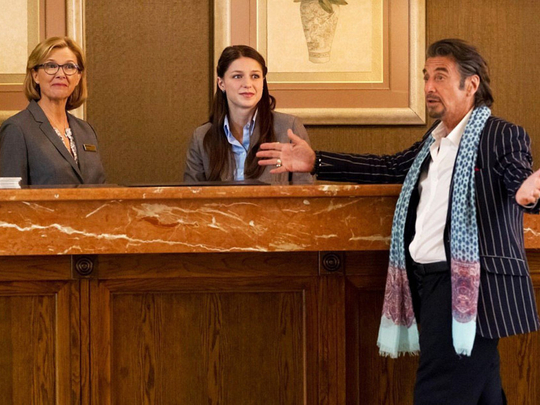
“I was the real thing once,” opines Al Pacino’s rock star protagonist Danny Collins in a moment of late-in-life crisis.
It’s true, the movie, also called Danny Collins, opens with a 1971-set prologue where a young, The Panic in Needle Park-era Pacino lookalike sits, trembling, for what looks like his first interview. Having just released the perfect Bob Dylan-meets-Tim Buckley folk album, Danny tells the reporter that John Lennon is his real hero and worries that fame and wealth will change him as an artist.
Cut to the present, and Danny Collins is a human jukebox with a stadium-sized audience of grey-haired men and women. His guitar and his soulful folk warbling have been replaced by a fake tan, shoe-polish hair, jazzy backup singers and a flashy production that’s dripping with cheese as he belts out one of his biggest hits Hey Baby Doll — an anthem that’s almost distractingly similar to Sweet Caroline.
He’s not happy, though. He has fame, fortune, an infinite supply of cocaine and shirts that only button up half way, and a fiancee who’s more than half his age, but something is missing. When his longtime manager (Christopher Plummer in a prefect sidekick role) presents him with a long-lost letter from John Lennon (and Yoko), telling him that fame doesn’t have to destroy a person and to call him sometime, Danny goes off in search for his essence in earnest.
His choice of location is suspect. He retreats to the Woodcliff Lake Hilton in New Jersey in an attempt to find himself, through some old fashioned song writing and flirting with women only 20 years his junior (an enchanting Annette Bening as a standoffish hotel manager). We soon discover that he’s picked this spot because of its proximity to the middle class home of his grown son (Bobby Cannavale, excellent), who he’s 40-some years too late to meet.
Pacino is warm, goofy and full of life as he tries to charm his way back into the life of his son, his pregnant daughter-in-law (Jennifer Garner) and their precocious kid (Giselle Eisenberg), who seems to defy all child actor stereotypes with a preternaturally realistic and wonderful performance that’s unnecessarily spoiled by the reveal that she suffers from an attention disorder.
Garner is also a particularly lovely addition, but seeing one of this generation’s most undervalued actresses in yet another stoic but understanding mother/wife role is distressing.
Writer-director Dan Fogelman (in his directorial debut) was inspired by the seeds of a true story after reading about an under-the-radar British folk singer, Steve Tilston, who had mentioned Lennon in an interview in 1971 and then, 34 years later, found out that the former Beatle had sent him a letter of encouragement.
Fogelman, who also wrote Crazy, Stupid, Love. and Last Vegas takes Tilston’s tale to Hollywood extremes. It’s the kind of mid-budget dramedy that has become increasingly rare in theatres. Despite some preposterous plot contrivances, Danny Collins coasts along with just the right mix of charisma, schlock and genuine humour — much of which comes from Pacino and Plummer.
While Danny Collins might not exist in any reality or provide a playbook for how to win over your estranged family, it is exceedingly pleasant to watch with some refreshingly original beats, including the fact that Pacino seems to like Bening’s character mostly because of their banter. Pacino, in particular, is terrific, giving his all without resorting to “Hoo-ah!” excess or self-parody.
A redemption story doesn’t always need to show the blood. Danny Collins gets the point across without pretention. Its closing scene, alone, is worth the price of admission.
As for Pacino, Danny Collins might not be that devastating Oscar-worthy return to his gritty independent roots, but it does reiterate that at 74, Pacino is still very much the real thing.









